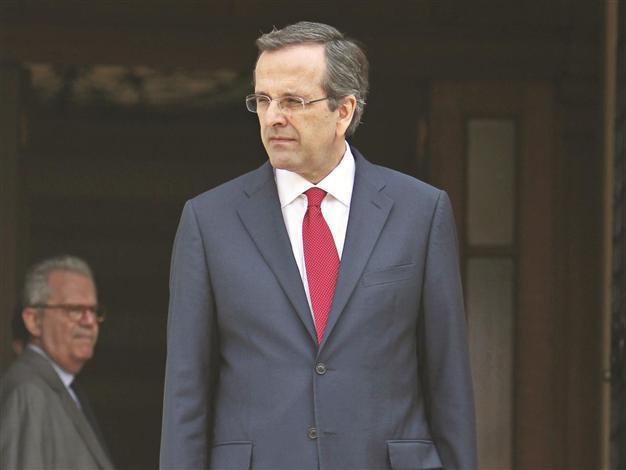Greece in need of ‘air to breathe,’ Samaras says
BERLIN - The Associated Press

Antonis Samaras. AP photo
Greece’s prime minister insisted ahead of a closely watched visit to Germany that Athens doesn’t want more money from creditors, but made clear in an interview published yesterday it would like more time to enact reforms and spending cuts.
Antonis Samaras vehemently rejected the suggestion that it might be better for Greece to leave the 17-nation euro and bring back its former currency, the drachma. That, he told Germany’s mass-circulation Bild daily, would result in “a catastrophe for Greece” and economic collapse.
Impatience growingSamaras pledged before coming to power to seek a two-year extension to the deadline for implementing unpopular cuts demanded in exchange for two massive international aid packages worth 240 billion euros that are keeping Greece afloat.
But delays in implementing reforms and austerity measures have fueled impatience in Germany - the largest single contributor to the bailouts - and other eurozone countries. German officials and lawmakers have made clear they’re in no mood to grant significant concessions, and speculation has grown that Greece will have to leave the euro.
Luxembourg Prime Minister Jean-Claude Juncker, who chairs the eurozone finance ministers’ meetings, went to Athens yesterday. Samaras then heads to Berlin and Paris on Aug. 24 and 25 for talks with German Chancellor Angela Merkel and French President Francois Hollande. Those meetings come ahead of an assessment of Greece’s efforts by inspectors from the so-called troika of the International Monetary Fund, European Union and European Central Bank.
“Let me be very clear: we are not asking for extra money,” Samaras was quoted as telling Bild. “We stand by our commitments and the implementation of all requirements. But we must encourage growth, because that reduces the financing gaps.”
“All we want is a little ’air to breathe’ to get the economy going and increase state income,” Samaras added, without specifying any timeframe. “More time does not automatically mean more money.”
No demand for write downGreece’s debt stands at more than 300 billion euros ($372 billion), and its economy is struggling through a fifth year of recession with unemployment above 23 percent. Still, asked whether Greece needs a second debt writedown following one carried through earlier this year, Samaras replied: “that has never been discussed.”
Some German politicians have talked openly in recent weeks about the possibility of Greece leaving the euro, and the vice chancellor, Economy Minister Philipp Roesler, has said that the idea of a Greek exit has “lost its horror.”
But the Athens government insists the country must remain in the euro - something which opinion polls have shown the vast majority of Greeks want.
